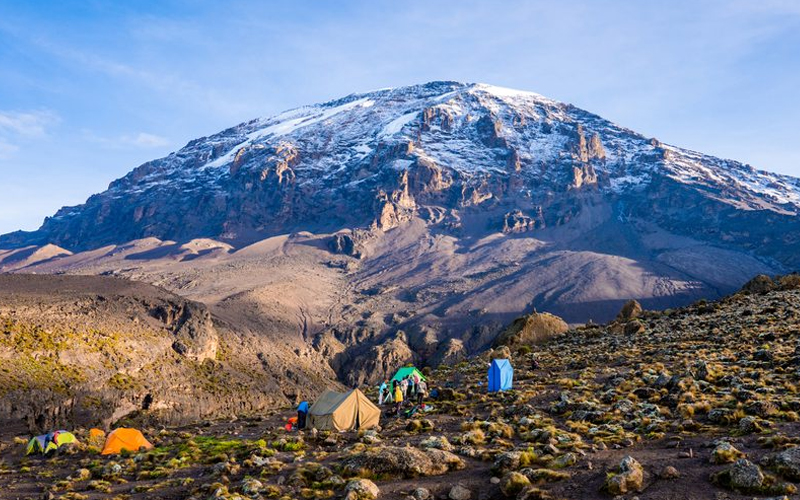Mount Kilimanjaro or just Kilimanjaro, with its three volcanic cones, "Kibo", "Mawenzi", and "Shira", is a dormant volcano in Tanzania. It is the highest
mountain in Africa, about 4,900 metres from its base, and 5,895 metres above sea level.
HIGHLIGHTS:
Climb Kilimanjaro using the Marangu route
Stay in mountain huts made of wood and stone along the way
Enjoy diverse ecosystems from rain forest to alpine desert
Day 1 : From Arusha:
drive to the Machame route, often called the “Whiskey Route”. From the Machame Park gate is a gentle climb up through the original montane forest, carpeted
with unique -busy lizzie- flowers, begonias and ferns. First camp amongst the giant heather at 3,000m. Ascent of 1,200m and 5 to 6 hours walking.
Day 2: Emerge from Heather zone
Hike through fine open moorland to camp by the Shira Cave at 3,840m. Herds of eland up here (& occasional lion!) and there are fascinating geological
features in the old volcanic caldera which can be viewed during a half-hour optional walk in the afternoon. Ascent 840m and 4 to 5 hours walking.
Day 3: From Shira,
climb towards the main peak Kibo, with the western glaciers clearly visible across the rugged high-altitude desert of volcanic rocks and boulders. Skirting
around its base and under the imposing western Breach, descend into the sheltered Barranco Valley for mid-way camp at 3,950m. 6 to 7 hours walking and only
110m total ascent but having climbed much higher and dropped back down assists acclimatization.
Day 4: Up the steep Barranco wall
With some sections of very easy scrambling and drop down again to the Karanga Valley where you take a break for lunch. After lunch hike on to Barafu Hut 4600m,
having hiked a total of 7 to 8 hours and ascended 650m. You have fantastic views across to Mawenzi peak from the camp after having completed a longer day of hiking
which now requires you to adequately relax in preparation of the challenging summit hike early the following morning.
Day 5: A bracing 1am start to climb the steep frozen scree
This is unavoidable on any route but we aim to go past Gillman’s Point to reach Stella Point on the crater rim for sunrise another 40 minutes and you are at the highest
point on the continent (Kibo:5900m), usually in warm sunshine. Return on the Mweka descent route. Ascent of 1,300m and about 7 hours trek to the summit; 2,600m descent
and 6 to 7 hours trek to the Mweka campsite (3400m) above Mweka gate. This is a long hard day but you feel absolutely ecstatic when you have done it!
Day 6: From Mweka campsite
A 4 to 5 hours descent through the forest to Mweka gate (depending on individual fitness) to collect certificates and meet the vehicle. Return to Arusha for the night.
Included:
All transport by private vehicle to and from the mountain
Accommodation as detailed on the itinerary.
Services of a private mountain guide, cook and adequate porters to carry both trip provisions and client’s private bags.
National Park entrance, accommodation and camping fees.
All food and catering equipment – breakfasts, lunches (packed when necessary) and evening meals prepared by our own cook. Special dietary requirements are catered for with prior arrangements at no extra cost.
Certificate of Achievement /appreciation from us.
Free storage of excess baggage not required on the mountain hike.
Crisis management apparatus – VHF 2-way radio/mobile phone, basic first aid kit and an on call vehicle.
Excluded:
Ravel and personal accident insurance.
Visa, passport, vaccinations, medicines.
Personal Mountain equipment. Tips.
Expenditure on alcoholic drinks, souvenirs and other personal items.
Optional excursions not detailed in the itinerary.
Additional optional accommodation added at the base hotel or extra days on the mountain added.
Treated drinking water other than boiled.
Extra costs incurred in case of own intentional change of itinerary while already on trek.
Porters to carry excess of 16Kg. personal luggage per client.
General:
Accommodation is camping throughout in 3 person mountain tents shared by two people. All your equipment will be carried by vehicles or local
porters; you only carry a daypack with personal gear. When camping you will not have to participate in camp chores. We buy fresh produce
locally and to ensure good standards of hygiene all food is prepared by our own staff. We can cater for special dietary requirements and
there are no extra food-kitty payments.

